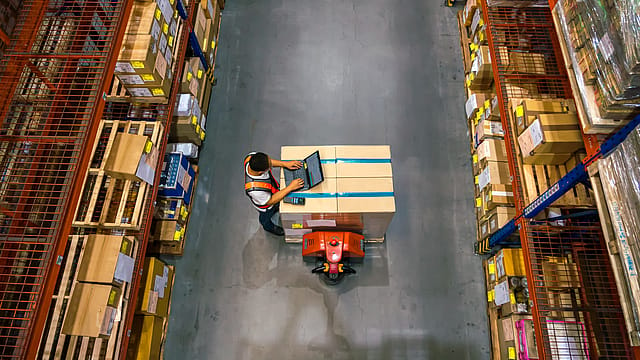Logistics seeing traction in auto, consumer goods, textiles: TCIL
ADVERTISEMENT

Integrated multi-modal logistics service provider, Transport Corporation of India Ltd. (TCIL), which posted one of the best quarterly numbers for April–June, is confident the next few quarters will remain “positive” on the back of festive demand and expects a “good growth trajectory” in the next few years.
Ruling out recession in the Indian economy, the company says good traction is visible in automobile, consumer goods, and textile, with stocking happening in the sectors in anticipation of the festive season.
TCIL managing director Vineet Agarwal told Fortune India, “We do believe that in the next few years, we should see a good growth trajectory. We are investing into it to be ready for that cycle,” Agarwal adds.
“The festival seasons are coming up. We are witnessing stocking in the textile and consumer sectors. Automobile movement is also good and there is also stocking happening there too. Overall the next few months definitely looks positive,” Agarwal adds.
With the revival in the auto segment, the company’s revenue in the supply chain solutions management has gone up. In Q1, FY23, the revenue from the supply chain solution division stood at ₹286 crore, up 34% from ₹214 crore in the same quarter of the previous financial year.
It is expected the vertical will remain a revenue grosser for the company, with the semiconductor crisis easing. “We have seen a good deal of growth in the supply chain business, which does a lot of work in the automotive sector, because the semiconductor crisis or the chip shortage is easing. There is a positive impact in terms of movement of vehicles more and more. That has contributed to our growth in the supply chain business,” says Agarwal.
“In the sea ways business, there is clearly a volume growth and value growth. Volume is because of last year’s impact of the second wave and value is because we have seen that the shipping rates across the world are high. Our ships operate on the coastal waters of India but we also operate to the neighbouring countries and there we get good rates. Container rates have positively impacted in terms of value growth,” says Agarwal.
Agarwal is of the view that the Indian economy is not decoupled with the global economy and a global meltdown will have a repercussion on India, though not as deep as a recession.
“We do not expect a recession in India but the impact of the global recession will be felt on India as we have a large export base in the country. Also, high inflation affects demand at some point or the other,” says Agarwal, adding the coming months look positive.
Bullish on India’s future prospects, the company has lined up ₹300 crore asset acquisition plans for the current financial year. The company plans to acquire ships, containers, trucks, and invest in hubs and warehouses.
Speaking about the asset acquisition plan this fiscal, Vineet Agarwal, managing director, TCIL told Fortune India, “We have a ₹300 crore capital expenditure plan for this year. Out of ₹300 crore, about ₹100 crore is earmarked for ships, ₹25-30 crore for containers, ₹50-60 crore will be deployed towards trucks and related assets, while the remaining will be for the new hub centres and warehouses.”
The company earned consolidated revenue of ₹908 crore in Q1 FY23, up 29.7% from ₹700 crore in Q1 FY22. The consolidated net profit for the quarter stood at ₹78.58 crore, up 66% from ₹47.4 crore in the same quarter of the previous fiscal.
Meanwhile, the company’s expenses too have gone up. Total consolidated expenses have gone up to ₹830 crore in the quarter compared with ₹649 crore in the corresponding quarter of the previous financial year.
Agarwal, meanwhile, points out the volume of expenditure is in line with the volume of the business generated in the quarter. “The increase in expenses is due to the increase in the business per se. The business has gone up by 30%. That explains the volume of the expenses is also going up. Did they go faster than the revenue? Not really. So I think it is not unusual,” he says.
On the impact of the high fuel prices, Agarwal says diesel prices are essentially a “pass through for us to our customers”. “There is no negative impact of the rising diesel prices on us,” he adds.